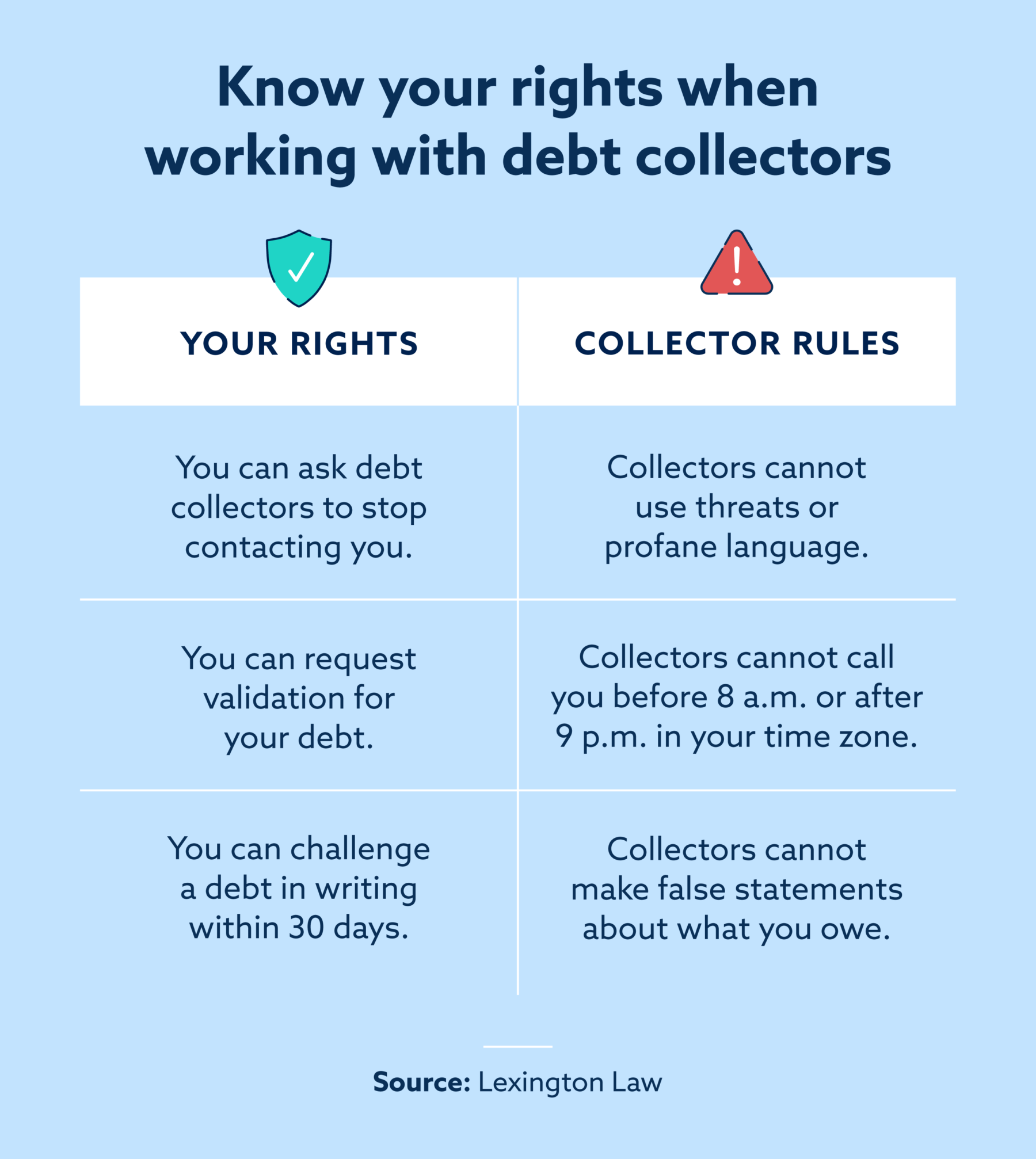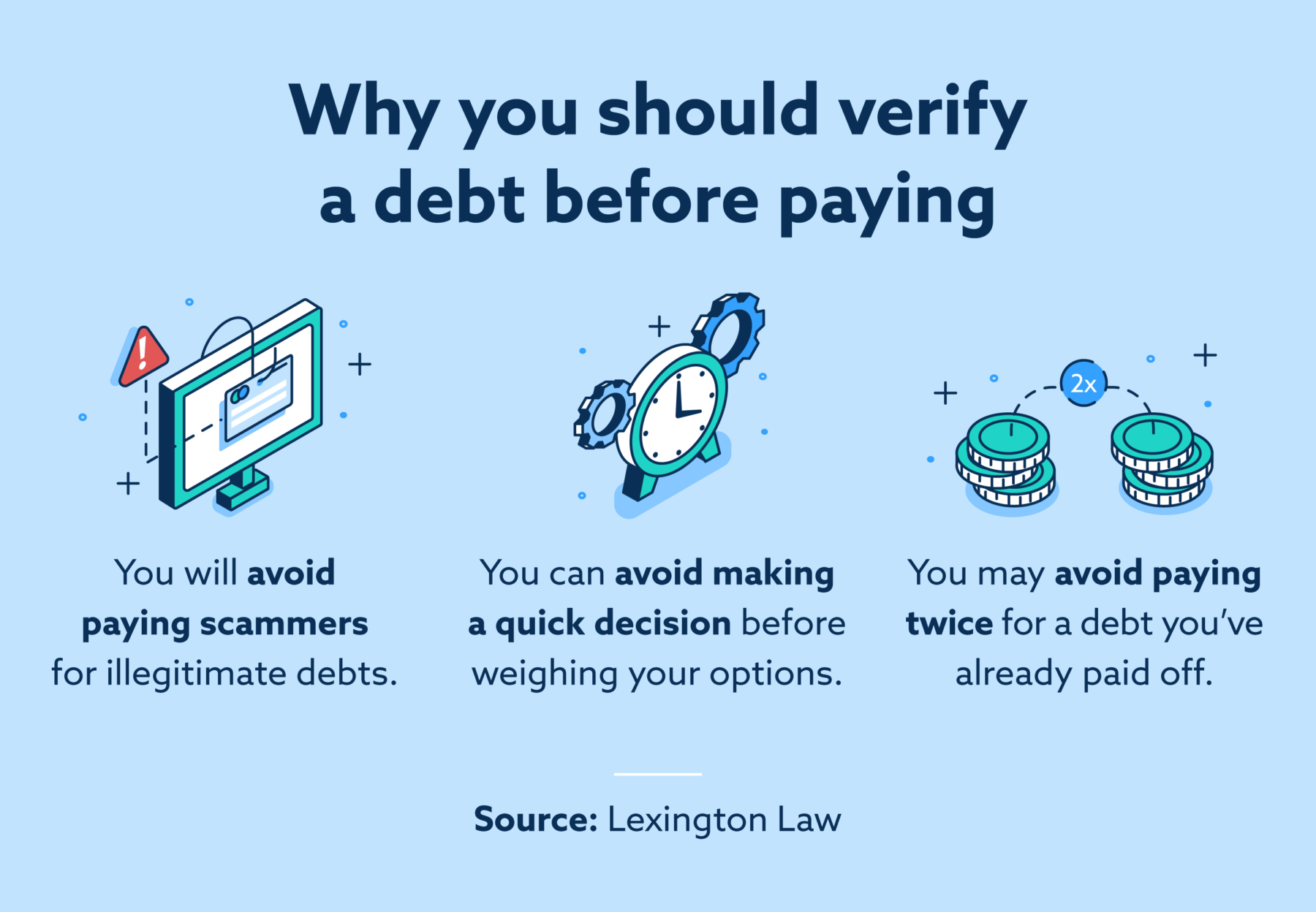
The information provided on this website does not, and is not intended to, act as legal, financial or credit advice. See Lexington Law’s editorial disclosure for more information.
When dealing with debt collectors, you should verify the debt is yours, know your rights and negotiate with the debt collector.
Being in debt can be stressful, and persistent calls from collection agencies can definitely add to that pressure. If you fail to make payments on your debt over a period of time — often three months or more — your debt will likely go to a collection agency which will contact you for payments. Avoiding a collection agency can negatively impact your credit, but knowing your rights and how to deal with debt collectors can help you control the situation.
Nonetheless, there are a few simple yet important steps to take whenever you’re contacted by a debt collector. Read on to learn more about the collection process, your rights and effective ways to deal with debt collectors.
Step 1: Know (and enforce) your rights
Debt collection agencies are bound by the Fair Debt Collection Practices Act (FDCPA), which protects consumers from many behaviors that were once common in the debt collection industry.
For example, the FDCPA prevents debt collectors from harassing or threatening you. It ensures that debt collectors disclose why they are calling you and that they offer validation for the debt when requested. Additionally, this law protects your privacy when collectors call other people about your debt, and gives you the right to request that debt collectors stop contacting you.

Here are a few other ways that debt collection laws regulate debt collectors:
Communication restrictions
Legally, debt collectors can only call you between the hours of 8 a.m. and 9 p.m. They also cannot call you at work if you ask them to stop. According to the FDCPA, debt collectors must provide you with a written notice within five days prior to contacting you.
Disclosures
In the written notice, debt collectors must inform you of the original creditor, the exact amount owed and your right to challenge the debt in writing within 30 days. They also are not allowed to disclose information about these debts to your family members or employers.
Behavior
Debt collectors cannot (and should not) use profane language, threaten you, make false claims about the consequences of nonpayment or lie about what you owe. They are not allowed to harass you in any manner.
If a debt collector violates any of these rules — or you believe that the debt is fraudulent — you can file a complaint. The Federal Trade Commission (FTC) accepts reports of fraud, and the Consumer Financial Protection Bureau (CFPB) enables you to submit a complaint about unlawful behavior by collection agencies. In 2019, the CFPB handled 75,200 complaints on debt collection, and 99 percent were handled by the end of the year.
Once you know your rights as a consumer, you’ll have the communication tools you need to verify the debt.
Step 2: Verify the debt is yours
When a debt collector contacts you, the first step is to verify that the debt is yours. This process, called debt validation, forces the collection agency to provide documentation that shows the debt belongs to you. In general, a collection agency must send you a validation letter when requested.

There are a few important reasons why you should always verify the debt:
- Avoid scams. By verifying that the debt is yours and that the collection agency is authorized to accept payment, you can avoid paying scammers for illegitimate debt.
- Avoid making an uninformed decision. Instead of responding immediately to the debt collector over the phone, you can look at the validation letter and consider your options with more time.
- Avoid paying twice. After receiving a validation letter, you may realize that you have already paid the debt in question. In this case, you can challenge the debt or initiate a credit dispute.
Additionally, it’s important to note that debt is subject to a statute of limitations, which means that debt is only valid for a certain time. The statute of limitations will vary based on the type of debt and the state that you are in, so you may want to consult a credit repair professional to determine if the debt is still valid.
If the debt is legitimate, you’ll need to make a plan to work with the collection agency to pay the debt off. Before doing so, make sure that you know your rights, which are protected by federal law.
Step 3: Communicate wisely and effectively
While you should always remain professional when speaking with debt collectors, you’ll also want to be strategic in your responses. Here are a few do’s and don’ts to keep in mind:
- Do: Request communication in writing if you prefer emails and letters over phone calls.
- Don’t: Admit the debt is yours unless you’re absolutely certain. You can kindly let them
- Do: Ask them to validate the debt in writing. This gives you a paper trail and allows time to investigate the debt’s legitimacy.
- Don’t: Yell or be rude. Instead, try your best to remain polite and professional even if the collector displays the opposite behavior.
Simply informing them of your preferred form of communication should suffice. Remember, you can ask debt collectors to stop contacting you at your workplace. Understanding your rights is key to taking control of the situation and avoiding feeling pressured.
Step 4: Negotiate with the debt collector
While it is your responsibility to pay legitimate debts, you’ll want to find a way to work with the debt collector to find an approach that works for your financial situation. Debt can be a burden, but it’s important not to ignore debt collectors, as they may be able to take you to court for failing to pay.
Here are a few things to keep in mind when negotiating with a debt collector:
- You may be able to set up a payment plan. In general, debt collectors want to start collecting something from you, so many are open to setting up a payment plan that works with your budget.
- You can sometimes settle a debt for less than you owe, but there are drawbacks. You’ll likely need to make a lump-sum payment, and your credit score may drop. Also, know that the amount of debt forgiven may be treated as taxable income.
- You should get everything in writing. Oral agreements are generally not enforceable, so make sure to get any agreement for a payment plan or debt settlement in writing before making any payments.
Once you negotiate your debt, you’ll want to begin making payments to get your finances back on track. There are many different strategies for paying off debt, like the snowball method, the avalanche method and the equality method.
Step 5: Seek help when you need it
Unfortunately, even after paying off your collection account, negative items may remain on your credit report for up to seven years, which can continue to impact your credit score over time. If you’re feeling overwhelmed with debt or contacts from debt collectors, there’s help available.
Many people who have collections on their credit report can benefit from working with credit repair consultants, who can assist with short- and long-term strategies for rebuilding your score. Credit repair companies specialize in finding and challenging errors on your credit report, helping remove inaccurate information.
Credit repair assistance
While you’ll likely need to pay back legitimate debt, you should verify the origin and amount before paying a debt collector. Additionally, you can hold debt collectors accountable under federal laws and even negotiate with them. Just be sure to get any agreement in writing.
If you’re concerned about inaccurate or unfairly reported amounts in collections on your credit report, you may need credit repair assistance. With the help of a reputable credit repair company, you’ll have experienced professionals in your corner to challenge inaccuracies and negative marks on your credit report.
With nearly 20 years of experience in credit repair, Lexington Law Firm has represented over 10.8 million people since 2004. Sign up for a free credit assessment today to see if credit repair is right for you.
Note: Articles have only been reviewed by the indicated attorney, not written by them. The information provided on this website does not, and is not intended to, act as legal, financial or credit advice; instead, it is for general informational purposes only. Use of, and access to, this website or any of the links or resources contained within the site do not create an attorney-client or fiduciary relationship between the reader, user, or browser and website owner, authors, reviewers, contributors, contributing firms, or their respective agents or employers.
